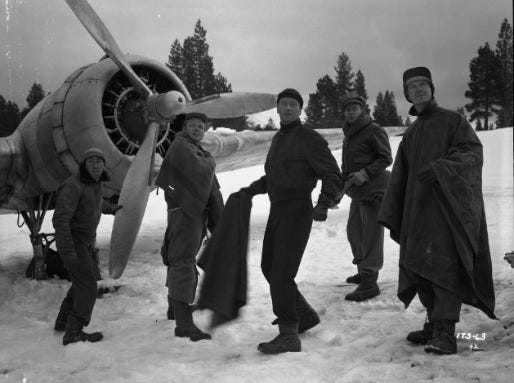Island in the Sky (1953)

"Island in the Sky" is something of a progenitor of the modern disaster flick. It's more limited in scope, with just five men trapped in the Canadian tundra when their plane is blown off course and runs out of fuel. But it has all the hallmarks of the disaster genre — an existential threat, mounting tension leading to antagonism among the survivors, a brief early hope for rescue that is soon dashed, and eventual salvation for most, due largely to their own ingenuity and grit.
Director William A. Wellman was a World War I pilot and aviation nut who often returned to aerial spectacles whenever he could. The footage of mid-century transport planes cruising around frozen mountaintops and forests is indeed breathtaking, though it gets a bit old after a while.
Written by Ernest K. Gaan, "Island" was based on Gann's own novel, a fictionalized version of a real-life rescue in which he took part as a search pilot in 1943. I found the entire film rather flat and emotionless, filled with a bunch of stock characters — with one or two notable exceptions.
The movie is best at depicting the quiet camaraderie of the civilian airline pilots recruited at the start of World War II, who, as the narration (provided by Wellman himself) describes, are "of the Army but not in the Army." They fly long, grueling supply runs in dangerous weather and even uncharted territories but are afforded a great deal of autonomy from the military command.
The title refers to the psychological sense of calm that pilots construct for themselves. They endeavor in a dangerous vocation that could lead to the death of their entire crew based on a single mistake. So they compensate by projecting a demeanor of unflappability that can be soothing to those around them but takes a toll on their own psyche.
John Wayne plays Dooley, the steely captain who manages to land his plane in an ice storm and then becomes the father/protector for his young charges. He must carefully ration the food, try to contact help using the plane's failing batteries to power the transmitter and keep his men from losing their heads.
One of them does lose his head, co-pilot Frank Lovatt (Sean McClory), who wanders off into a storm and becomes snow blind. In perhaps the film's only moment of true power, Wellman pulls back the camera on Lovatt's body being quickly covered with falling snow to reveal that the man is actually only a few feet from the tail section of his plane.
Wayne was much praised for his performance because he largely abandons the familiar cocky persona and embodies the role of a man up to his neck in panicky fear, laboring hard not to show it.
The other three crew members are pretty standard archetypes — a no-nonsense galoot, a hyperactive radioman and a fresh-faced kid with a new baby at home. They never make any sort of real impact as distinctive characters.
Similarly, the fellow pilots who take up the search for Dooley and his crew are standard issue, and include James Arness as a big bruiser.
The one actor I couldn't keep my eyes off of is Andy Devine as Willie Moon, the unofficial leader of the search effort. The size of a buffalo and as cool as a cat, Moon likes to seem unperturbed by everything. At one point, his crewman accuses him of appearing to actually care about something, and Willie furiously denies it.
Devine gives him all sorts of little signatory tics, like using a clothespin in the cockpit to hold his cigarette or using a little grabber tool to work the comm switches rather than trying to shift his tremendous bulk.
As was frequent with Wellman's films, women are shunted to a far back burner. We only glimpse two or three female characters in flashback or telephone cutaway scenes. I get the sense Wellman included even those only begrudgingly.
A couple of nits I'd like to pick: When the other planes are searching for the lost crew, they fly in a close formation together rather than spreading out — not a very effective way to cover lots of ground. Also, despite the frigid temperature of minus-70 degrees being repeated ad nauseum to pump up the audience's sense of peril, none of the actors' breath is ever visible.
For a flick based on a true story, "Island in the Sky" feels like bunch of studio hooey.
3 Yaps



